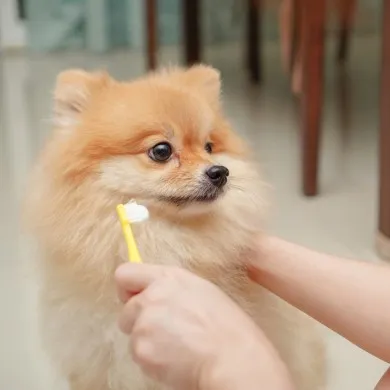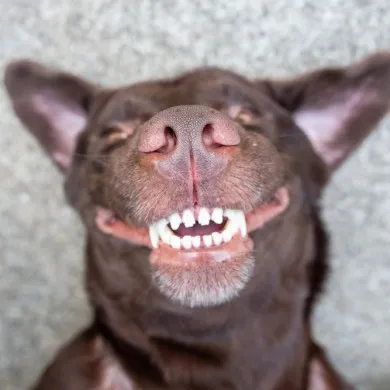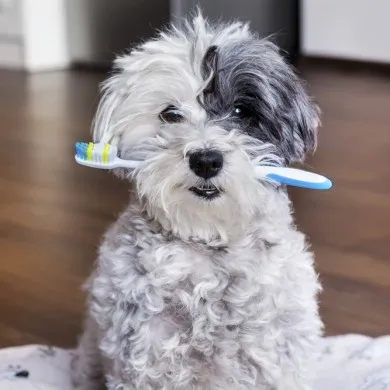Winter symbolises joy, celebration and festive vibes, but it also brings along a set of challenges for our furry companions. With the onset of this chilly season, dog owners need to be wary of the potential dental issues that can arise during this weather. Are you taking the necessary steps to ensure your dog’s teeth cleaning is on point?
Let's learn about the dangers and find out how you can safeguard your canine friend's dental health this winter.
Winter Dental Issues for Dogs
These freezing months can be the reason behind certain dental issues for your pawed pals, such as -
1. Cold Weather and Dental Sensitivity
The chilly winter air can lead to heightened sensitivity for your dog's teeth, potentially causing discomfort, especially if your pup already has existing dental issues. If your dog is excessively pawing at the mouth, reluctant to eat, or whining during meals, these could indicate discomfort related to the colder temperatures affecting their dental well-being.
2. Dry Indoor Air and Oral Health
Central heating systems in homes during winter lead to dry indoor air, which can significantly impact your dog's oral health. The lack of moisture in the air can potentially contribute to the formation of plaque on your dog's teeth. This, in turn, can worsen existing dental issues and increase the risk of new problems emerging.
3. Ice Chewing Hazards
Beware of the winter pastime of allowing your dog to chew on ice. It may seem harmless but can pose significant risks to your furry pals. They may be at risk of dental fractures when crunching on hard ice. Exercise caution during walks and playtime, actively discouraging excessive ice chewing to prevent potential dental emergencies.
4. Limited Outdoor Activities
Dogs prefer staying indoors during winter due to colder temperatures, which means reduced outdoor activities. Limited exercise can affect their overall health, including dental well-being. To be precise, inactivity may lead to weight gain and a potential decline in dental health, as regular movement helps in maintaining optimal circulation and saliva production, both crucial for oral hygiene.
5. Increased Tartar Buildup
Cold weather during the winter season combined with potential changes in dietary habits can result in increased tartar formation in your furry pal’s mouth. If left unaddressed, prolonged tartar buildup can lead to gingivitis and other severe dental problems. Only cleaning your dogs' teeth is not enough, you need to monitor their overall dental hygiene closely as well. Don’t ignore it!
6. Unnoticed Oral Pain
What makes it more challenging to identify their dental issues is that your pawed companions may not always express their pain verbally. On top of that, winter celebrations and holiday festivities can act as a distraction and further mask the signs of their oral discomfort. If your dog is behaving unusually, especially during mealtimes, that could be a sign.
7. Risk of Gum Injuries
Winter poses unique challenges for dogs, including the potential risk of gum injuries. Frozen surfaces, such as icy pavements and snow-covered areas, can injure the gums of your furry pals. What’s even worse is that hard objects hidden beneath the snow or ice can lead to accidental trauma to their gums during play or exploration during this cold season.
Understanding and addressing these winter-specific dental concerns will ensure a happier and healthier season for your furry friend. So, how can you help them? By learning how to clean your dog’s teeth at home? That’s a good start. Let’s find out more in the next section!
How to Prevent Winter Dental Issues
Here are some effective ways to maintain oral hygiene and prevent dental issues for dogs during these frigid months
1. Dog Teeth Cleaning at Home
As a pet parent, the first thing you need to learn is brushing your dog's teeth at home. Do some research and find out the best practices in the community. Try a few techniques with your furry pal to find the one that suits your case the best.
Learning how to clean your dog’s teeth at home is the first step. Now that you know it, which toothbrushes and toothpaste are safe for dogs? How can you make the brushing experience more enjoyable?
2. Use the Right Products
Next, find toothpaste and toothbrushes crafted specifically for your pawed pal to elevate their overall brushing experience during these chilling months. Although several products are available on the market, not all are made equal.
A reliable brushing kit can be a game changer as it will not only clean your pawed companion’s pearly whites to perfection but also maintain their overall oral hygiene. What’s more, some renowned brands also offer edible toothpaste for your furry pals that pose no threat when ingested.
3. Brush the Right Way
The best way to clean your dog’s teeth is by adopting a gentle circular motion, focusing on the gum line and all tooth surfaces. This method is ideal to ensure safe and effective brushing as well as an enjoyable session. Gradually increase the brushing duration as your dog becomes more comfortable.
As a pro tip, consider introducing your dog’s teeth cleaning as part of their routine from the moment you bring them home. Establishing early dental care habits helps your furry pal become accustomed to the process and reduces resistance in the future.
4. Be Consistent and Vigilant
Consistency is key when it comes to maintaining good dental health. Keeping this in mind, try brushing your dog’s teeth daily to prevent the accumulation of plaque and address potential dental issues in their early stages.
Dental issues can progress rapidly, and delaying preventive measures may lead to more serious problems. Act promptly if you notice any signs of discomfort, changes in eating habits, or unusual behaviour related to your dog's oral health and prioritise it.
5. Get Some Interactive Toys
Be cautious about allowing your dog to chew on ice during this festive season. Instead, invest in dental care toys to keep them engaged. How can you make playtime an interactive dental care session, you ask?
Well, chewing on appropriate items can help reduce plaque and tartar buildup. This, in turn, serves as a supplemental method for cleaning your dog’s teeth and maintaining their oral hygiene naturally.
6. Balanced Diet for Dental Health
Nutrition plays a crucial role in maintaining good dental health. So, which foods promote healthy teeth? How can you ensure your dog gets a balanced diet during winter? Talk to veterinary experts and pet nutritionists to find which foods are best for your pawed pal’s optimal dental hygiene.
To take your furry companion’s oral health game to the next level, you can try reliable supplements from reputed brands like a simple-to-use dental care powder and mix it with their food. These often come with natural and premium ingredients that ensure fresh breath and optimal oral hygiene.
Remember, proactive dental care is a year-round commitment, and winter is no exception. As winter unfolds, don't let the cold weather cast a shadow on your dog's dental health. Besides dog’s dental care, by being proactive and incorporating these preventive measures into your routine, you can ensure your furry pal enjoys this festive season without worrying about dental issues.









